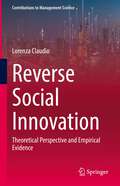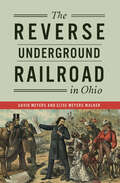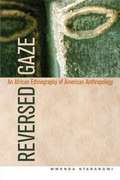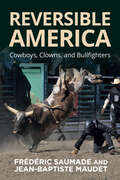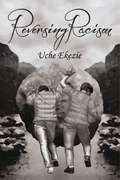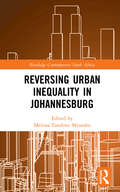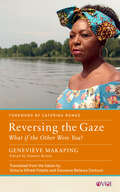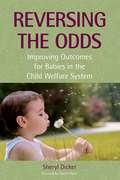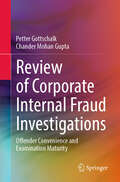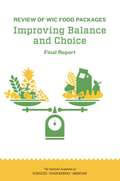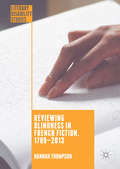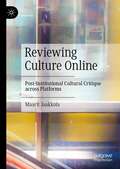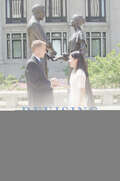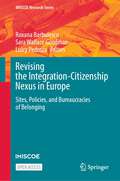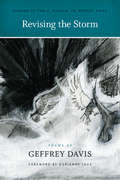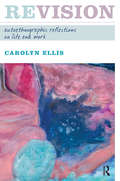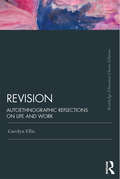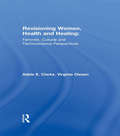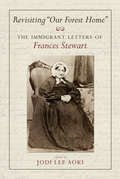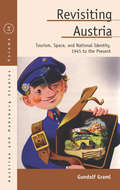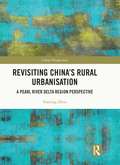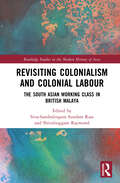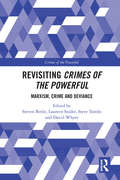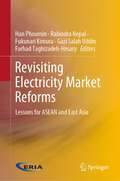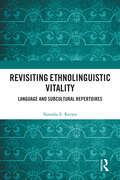- Table View
- List View
Reverse Social Innovation: Theoretical Perspective and Empirical Evidence (Contributions to Management Science)
by Lorenza ClaudioThis book presents important insights into Social Innovation and Reverse Innovation. It introduces a unique perspective by merging Social Innovation with the emerging concept of Reverse Innovation. Addressing the scarcity of Reverse Innovation knowledge, the book starts with a comprehensive literature review, establishing a solid theoretical framework.By leveraging the core contributions of both concepts, a new idea is developed: Reverse Social Innovation. This unexplored notion is rigorously examined through a novel conceptual model and validated via mixed-method research. Case studies showcase instances of Reverse Social Innovation, while content analysis refines the model. The book is valuable for practitioners, researchers, and students. Practitioners can explore the potential of Reverse Social Innovation for impactful change. Researchers delve into the uncharted territory of Reverse Innovation and its intersections. Students engage with a cutting-edge research field, opening doors for future exploration.
Reverse Underground Railroad in Ohio, The
by David Meyers Elise Meyers WalkerPrior to the Civil War, thousands escaped slavery via the Underground Railroad. Untold others failed in the attempt. These unfortunate souls were dragged into bondage via the Reverse Underground Railroad, as it came to be called. With more lines on both roads than any other state, the Free State of Ohio became a hunting ground for slave catchers and kidnappers who roamed the North with impunity, seeking "fugitives" or any person of color who could be sold into slavery. And when they found one, they would kidnap their victim and head south to reap the reward. Authors David Meyers and Elise Meyers Walker reveal not only the terror and injustice but also the bravery and determination born of this dark time in American history.
Reversed Gaze
by Mwenda NtarangwiDeftly illustrating how life circumstances can influence ethnographic fieldwork, Mwenda Ntarangwi focuses on his experiences as a Kenyan anthropology student and professional anthropologist practicing in the United States and Africa. Whereas Western anthropologists often study non-Western cultures, Mwenda Ntarangwi reverses these common roles and studies the Western culture of anthropology from an outsider's viewpoint while considering larger debates about race, class, power, and the representation of the "other. " Tracing his own immersion into American anthropology, Ntarangwi identifies textbooks, ethnographies, coursework, professional meetings, and feedback from colleagues and mentors that were key to his development. Reversed Gaze enters into a growing anthropological conversation on representation and self-reflexivity that ethnographers have come to regard as standard anthropological practice, opening up new dialogues in the field by allowing anthropologists to see the role played by subjective positions in shaping knowledge production and consumption.
Reversible America: Cowboys, Clowns, and Bullfighters
by Frédéric Saumade Jean-Baptiste MaudetRodeo, cattle ranching, and bullfighting converge in the arenas of race, gender, and ethics in Reversible America. In Southwestern California, these sports manifest in spectacular expressions of transcultural interactions that continue to develop through border crossings. Using an interdisciplinary scope, this unique look into the subculture negotiates the paradoxes and connections between the popular American performances, Iberian bullfighting, and Native American hunting methods, along with the relationship between human and non-human beings, and systems of value across borders.
Reversing Racism
by Uche EkezieThis book is written to tackle what in recent times has become a significant issue when equity in multiracial settings is being discussed, especially as globalization continues to encourage diversity and inclusion around the world. It begins, like most books on the subject, by giving the reader a view of the different expressions of racism; and as the reader progresses, the book provides suggestions on what victims of racism can do collectively on their part to proactively reverse circumstances that invite racism. The book’s intent is not to exacerbate racial tensions; instead it is a call to positive action that can roll back the symptoms which perpetuate racism with an action plan that aims to reduce its manifestations in society. It is a gathering of the authors thoughts on what minorities in the West and people of African descent, as the main victims of racism can do to subtly address the traits that encourage racists’ behavior. In writing this book the author hopes to galvanize readers into undoing the social structures that ensure people of color remain economically and socially disadvantaged and thus easy prey for racists. It is of course based on his personal experiences and thoughts on the subject; hence, there might be points with which some readers may differ in opinion. To better appreciate what these experiences are, the book begins with a little background on the author, before delving into the subject matter in the subsequent chapters. The author has made the book as condensed as possible by not overelaborating the points raised. It is a light read, with language simple and easy for the lay as well as the scholarly to understand. This way every kind of reader can appreciate it, even those who do not like voluminous books can get through it in a day or two. So, please go ahead and enjoy this brave foray into the sensitive subject of racism.
Reversing Urban Inequality in Johannesburg (Routledge Contemporary South Africa)
by Melissa Tandiwe MyamboWith the spread of capitalism - a socio-economic system that produces both wealth and poverty simultaneously - the spatial dynamics of the "global(izing)" city are creating more division between social classes, not less. This means that in the 21st-century, large cities around the world exhibit intensifying spatial inequality taking the form of a wealthy, privileged urban core ringed by a periphery of lower-income denizens far removed from the city’s resources and amenities. This trend toward swelling socio-spatial division is especially pronounced in cities purporting to be "global", or in the case of Johannesburg, South Africa’s financial capital, a "world-class African city." Ironically, Johannesburg’s historical legacy of immense spatial inequality thanks to apartheid is the direction in which most "global(izing)" cities such as New York, Cairo, London, Shanghai, New Delhi, Jakarta, Lagos, Berlin, and São Paulo are headed. The globalization of neoliberal urban policy has made the city less welcoming, liveable, accessible and friendly for lower-income city residents. This book asks if Johannesburg can unstitch its complex urban fabric to create a city with more democratic public transport, affordable housing in desirable locations and safe, socially and racially integrated public spaces. These pithy, solidly researched, accessibly written essays are instructive for all those who are interested in questions of spatial justice, urban development, history and planning and the general goal of making cities more livable and accessible for urban dwellers of all income levels.
Reversing the Gaze: What if the Other Were You? (Other Voices of Italy)
by Geneviève MakapingTired of being scrutinized, criticized, and fetishized for her black skin, Cameroon-born scholar Geneviève Makaping turns the tables on Italy’s white majority, regarding them through the same unsparing gaze to which minorities have traditionally been subjected. As she candidly recounts her experiences—first across Africa and then as a migrant Black woman in Italy—Makaping describes acts of racist aggression that are wearying and degrading to encounter on a daily basis. She also offers her perspective on how various forms of inequality based on race, color, gender, and class feed off each other. Reversing the Gaze invites readers to confront the question of racism through the retelling of everyday occurrences that we might have experienced as victims, perpetrators, or witnesses.
Reversing the Odds: Improving Outcomes for Babies in the Child Welfare System
by Sheryl Dicker J. DBabies and young children in the child welfare system have a high prevalence for physical, cognitive, and social-emotional delays—and often don't have access to the services and supports that could make all the difference. This is the book that will help professionals go beyond abuse prevention and ensure comprehensive healthy development of these vulnerable children from birth to age 3. Demystifying the world of child welfare, this book shows early childhood practitioners how to successfully navigate this complex system and collaborate with a wide range of other professionals to meet young children's needs.
Review of Corporate Internal Fraud Investigations: Offender Convenience and Examination Maturity
by Petter Gottschalk Chander Mohan GuptaThis book discusses the role of whistleblowing in the detection of white-collar crime through examination of publicly available internal investigation reports and evaluation of allegations and suspicions of potential misconduct. The analysis focuses on offender convenience, considering factors such as motive, opportunity, and willingness to engage in deviant behavior. This process also evaluates the maturity of the investigation, critically reviewing the report for relevance, information sources, and basis of conclusions, in order to assign the investigation to a stage on the following growth models: • Activity oriented investigation • Problem oriented investigation • Detection oriented investigation • Value oriented investigation. This approach facilitates a comprehensive understanding of the investigation process and its findings. The method used aims to prove the presence of deviant behavior in the white-collar officials and impact of a clean investigation process. This book is ideal for scholars and practitioners of white-collar crime.
Review of WIC Food Packages: Final Report
by Engineering Medicine National Academies of SciencesThe Special Supplemental Nutrition Program for Women, Infants, and Children (WIC) began 40 years ago as a pilot program and has since grown to serve over 8 million pregnant women, and mothers of and their infants and young children. Today the program serves more than a quarter of the pregnant women and half of the infants in the United States, at an annual cost of about $6.2 billion. Through its contribution to the nutritional needs of pregnant, breastfeeding, and post-partum women; infants; and children under 5 years of age; this federally supported nutrition assistance program is integral to meeting national nutrition policy goals for a significant portion of the U.S. population. To assure the continued success of the WIC, Congress mandated that the Food and Nutrition Service of the U.S. Department of Agriculture (USDA) reevaluate the program’s food packages every 10 years. In 2014, the USDA asked the Institute of Medicine to undertake this reevaluation to ensure continued alignment with the goals of the Dietary Guidelines for Americans. In this third report, the committee provides its final analyses, recommendations, and the supporting rationale.
Reviewing Blindness in French Fiction, 1789–2013
by Hannah ThompsonThis book argues that the most interesting depictions of blindness in French fiction are those which call into question and ultimately undermine the prevailing myths and stereotypes of blindness which dominate Western thought. Rather than seeing blindness as an affliction, a tragedy or even a fate worse than death, the authors examined in this study celebrate blindness for its own sake. For them it is a powerful artistic and creative force which offers new and surprising ways of describing, and relating to, reality. Canonical and lesser-known novels from a range of genres, including the roman noir, science fiction, auto-fiction and realism are analyzed in detail to show how the presence of blind characters invites the reader to abandon his or her traditional reliance on the sense of sight and engage with the world in sensual, and hitherto unexpected, ways. This book challenges everything we thought we knew about blindness and invites us to revel in the pleasures and perils of reading blind.
Reviewing Culture Online: Post-Institutional Cultural Critique across Platforms
by Maarit JaakkolaThis book examines how ordinary users review cultural products online, ranging from books to films and other art objects to consumer products. The book maps different communities—in institutional and non-institutional settings—which intersect with the genre of review, especially in the social web where reviewing is conducted on platforms such as Instagram, YouTube and Vimeo. The book, drawing on the key concepts of cultural intermediation, platformized cultural production and post-professionalism, looks at user-generated content in lifestyle communities beyond the binary of professional and amateur production.
Revising Eternity: 27 Latter-day Saint Men Reflect on Modern Relationships
by Stephen Carter Ted Smith Dan Smith John Doe David Nicolay Joey Franklin Kevin Barnwell Scott Blanding Joseph Broom T. Kay Browning Michael Carpenter Tyler Chadwick Kelland Coleman John B Dahl Scot Denhalter Theric Jepson Clyde Kunz Scott Russell Morris Thomas W Murphy Boyd Jay Petersen Robert Raleigh Robert A. Rees Eric Robeck Caleb Scoville Kim Siever Nicholas Don Smith Andrew SpriggsMarriage’s central role in The Church of Jesus Christ of Latter-day Saints distinguishes the faith while simultaneously reflecting widespread American beliefs. But what does Latter-day Saint marriage mean for men? Holly Welker presents a collection of essays exploring this question. The essayists provide insight into challenges involving sexuality, physical and emotional illness, addiction, loss of faith, infidelity, sexual orientation, and other topics. Conversational and heartfelt, the writings reveal the varied experiences of Latter-day Saint marriage against the backdrop of a society transformed by everything from economic issues affecting marriage to evolving ideas about gender. An insightful exploration of the gap between human realities and engrained ideals, Revising Eternity sheds light on how Latter-day Saint men view and experience marriage today.
Revising the Integration-Citizenship Nexus in Europe: Sites, Policies, and Bureaucracies of Belonging (IMISCOE Research Series)
by Sara Wallace Goodman Luicy Pedroza Roxana BarbulescuThis open access book critically re-examines the theoretical and empirical interconnections between integration and citizenship, specifically, naturalisation. With new, empirical-grounded analyses of what we term 'citizenship-integration nexus' the central, shared contribution is showcasing how membership is informally achieved through everyday integration —usually around, but sometimes in spite of, formal citizenship requirements. By providing evidence of a nexus disjuncture, the book contributes to critical dialogues on immigrant integration and political incorporation, relevant for policymakers, civil society actors, and academics alike.
Revising the Storm (A. Poulin, Jr. New Poets of America)
by Geffrey DavisThis debut collection by Cave Canem fellow Geffrey Davis burrows under the surface of gender, addiction, recovery, clumsy love, bitterness, and faith. The tones explored—tender, comic, wry, tragic—interrogate male subjectivity and privilege, as they examine their "embarrassed desires" for familial connection, sexual love, compassion, and repair. Revising the Storm also speaks to the sons and daughters affected by the drug/crack epidemic of the '80s and addresses issues of masculinity and its importance in family.Some nights I hear my father's long romancewith drugs echoed in the skeletal choirof crickets.Geffrey Davis teaches at Penn State University.
Revision: Autoethnographic Reflections on Life and Work (Writing Lives: Ethnographic Narratives #8)
by Carolyn EllisCarolyn Ellis is the leading writer in the move toward personal, autobiographical writing as a strategy for academic research. In addition to her landmark books Final Negotiations and The Ethnographic I, she has authored numerous stories that demonstrate the emotional power and academic value of autoethnography. This volume collects a dozen of Ellis’s stories—about the loss of her husband, brother and mother; of growing up in small town Virginia; about the work of the ethnographer; about emotionally charged life issues such as abortion, caregiving, and love. Atop these captivating stories, she adds the component of meta-autoethography—a layering of new interpretations, reflections, and vignettes to her older work. An important new work for qualitative researchers and a student-friendly text for courses.
Revision: Autoethnographic Reflections on Life and Work (Writing Lives: Ethnographic Narratives Ser. #8)
by Carolyn EllisCarolyn Ellis is a prominent writer in the move toward personal, reflexive writing as an approach to academic research. In addition to her landmark books Final Negotiations and The Ethnographic I, she has authored numerous stories that demonstrate the emotional power and academic value of autoethnography. Now issued as a Routledge Education Classic Edition, Revision: Autoethnographic Reflections on Life and Work collects a dozen of Ellis’s stories—about the loss of her husband, brother and mother; of growing up in small town Virginia; about the ethical work of the ethnographer; and about emotionally charged life issues such as abortion, caregiving, and love. Atop these captivating stories, she adds the component of meta-autoethography—a layering of new interpretations, reflections, and vignettes to her older work. A new preface text by the author reflects on the subsequent developments in the author’s life and her vision for autoethnography since the book’s original publication. Demonstrating Carolyn’s extensive contribution to autoethnographic scholarship, this new edition offers compelling ideas and stories for qualitative researchers and a student-friendly text for courses.
Revisioning Women, Health and Healing: Feminist, Cultural and Technoscience Perspectives
by Adele E. Clarke Virginia OlesenThis engaging collection examines the implications and representations of race, class and gender in health care offering new approaches to women's health care. Subjects covered range from reproductive issues to AIDS.
Revisiting "Our Forest Home": The Immigrant Letters of Frances Stewart
by Jodi Lee AokiFrances Stewart arrived in Upper Canada from Ireland in 1822 with her husband, three children, and two servants. The family settled in Douro Township on the bank of the Otonabee River in 1823. Spanning three-quarters of a century, her letters represent the immigrant experience of one of the first pioneer women in the Peterborough, Ontario, area. Included are transcripts of the extant collection. They chronicle the three stages of Francess life: the years of her childhood in Ireland to her departure for North America; her voyage across the Atlantic and her life in Upper Canada to the time of her husbands death in 1847; and the period of widowhood until her death in 1872. The chapter summaries, annotations, and key passages extracted from letters written by others further the story of Francess nineteenth-century immigrant life. Advance Praise for Revisiting Our Forest Home Presenting the perspective of a cultivated immigrant who refrained from publication, Frances Stewarts articulate letters to her family and friends nicely complement the narratives of her Peterborough neighbours, Susanna Moodie and Catharine Parr Traill. Jodi Aokis intelligent approach to the editorial complexities of the Stewart archive has given us a reliable and welcome volume that makes an important contribution to our understanding of womens lives on the Upper-Canadian frontier. Carole Gerson, University Professor, English Department, Simon Fraser University Revisiting Our Forest Home is a welcome addition to the scholarly record of nineteenth-century writing and letters by immigrant gentlewomen to Upper Canada. To have this well-edited and thoughtful record of Stewarts struggles available is a boon to scholars, old and new. With precision and tenderness, Jodi Aoki brings forward these important and culturally revealing letters. In her hands, the original Our Forest Home, initially a project meant only for family members, becomes a valuable and much fuller record of social and family life in early Ontario. Michael Peterman, Professor Emeritus, Trent University, FRSC
Revisiting Austria: Tourism, Space, and National Identity, 1945 to the Present (Austrian and Habsburg Studies #28)
by Gundolf GramlFollowing the transformations and conflicts of the first half of the twentieth century, Austria’s emergence as an independent democracy heralded a new era of stability and prosperity for the nation. Among the new developments was mass tourism to the nation’s cities, spa towns, and wilderness areas, a phenomenon that would prove immensely influential on the development of a postwar identity. Revisiting Austria incorporates films, marketing materials, literature, and first-person accounts to explore the ways in which tourism has shaped both international and domestic perceptions of Austrian identity even as it has failed to confront the nation’s often violent and troubled history.
Revisiting China's Rural Urbanisation: A Pearl River Delta Region Perspective (China Perspectives)
by Daming ZhouThis book analyses the urbanisation of rural China in the period of the country’s reform and opening-up based on an investigation of five villages in the Pearl River Delta region, analysing progress, problems and future prospects in the light of long-term investigations on the ground and follow-up fieldwork. Drawing on a vast body of data obtained from participation observation, interviews, archival documents, questionnaires, and oral histories, the author charts the trajectory of urbanisation as rural landscapes, governance models, social structures and development dynamics have morphed into urban phenomena. Stimulated by outside capital and pro-growth policies, each of the five villages has undergone a distinct economic, social, institutional, cultural and demographic transformation while facing challenges and opportunities such as land requisition, residential areas with a strong concentration of migrants, changing power relations between state and local community, the influence of traditional lineage and clan structures and quandaries over identity. The book will appeal to scholars and students of sociology and Chinese Studies as well as general readers interested in contemporary China and Chinese urbanisation.
Revisiting Colonialism and Colonial Labour: The South Asian Working Class in British Malaya (Routledge Studies in the Modern History of Asia)
by Sivachandralingam Sundara Raja and Shivalinggam RaymondThis book argues that the prevailing view of colonialism – that it was a negative and destructive phenomenon – needs to be rethought. It focuses on the experiences of the South Indian working class, large numbers of which came to Malaya in the early years of the twentieth century, emigrating from socially, economically, and environmentally inhospitable south India. It examines the opportunities which colonialism presented for these people, highlighting also the British approach to colonialism in Malaya, an approach which emphasised conservativism and tradition, and which protected the interests of the Malay aristocrat classes and, by extension, the Malay masses in order to compensate for European economic dominance and the influx of a non-Malay labour force. Overall, the book demonstrates that the South Indians, a class whose identity, social existence, and prospects were inextricably linked to imperial processes, benefitted from colonialism, and should be viewed as an active transnational entity within a constructive system, rather than as passive victims of repressive, destructive forces.
Revisiting Crimes of the Powerful: Marxism, Crime and Deviance (Crimes of the Powerful)
by David Whyte Steve Tombs Steven Bittle Laureen SniderFrank Pearce was the first scholar to use the term 'crimes of the powerful.' His ground-breaking book of the same name provided insightful critiques of liberal orthodox criminology, particularly in relation to labelling theory and symbolic interactionism, while making important contributions to Marxist understandings of the complex relations between crime, law and the state in the reproduction of the capitalist social order. Historically, crimes of the powerful were largely neglected in crime and deviance studies, but there is now an important and growing body of work addressing this gap. This book brings together leading international scholars to discuss the legacy of Frank Pearce’s book and his work in this area, demonstrating the invaluable contributions a critical Marxist framework brings to studies of corporate and state crimes, nationally, internationally and on a global scale. This book is neither a hagiography, nor a review of random areas of social scientific interest. Instead, it draws together a collection of scholarly and original articles which draw upon and critically interrogate the continued significance of the approach pioneered in Crimes of the Powerful. The book traces the evolution of crimes of the powerful empirically and theoretically since 1976, shows how critical scholars have integrated new theoretical insights derived from post-structuralism, feminism and critical race studies and offers perspectives on how the crimes of the powerful - and the enormous, ongoing destruction they cause - can be addressed and resisted.
Revisiting Electricity Market Reforms: Lessons for ASEAN and East Asia
by Farhad Taghizadeh-Hesary Fukunari Kimura Han Phoumin Rabindra Nepal Gazi Salah UddinThis book combines the fundamentals of industrial organization theories based on microeconomic foundations, applied econometrics and environmental and natural resource economics in undertaking a comprehensive review of reforms of the power sector and its impact on industrial and socio-economic performance. The book provides the reader with the intellectual groundwork necessary for understanding the workings and interactions of today’s reforming power markets such as in the ASEAN and East Asia that are striving to achieve the energy policy trilemma of affordability, energy sustainability and energy security. The topics addressed in this book include application of welfare theorems such as competition in and for the market in the electricity sector, market failures such as lack of electricity access, analysis of forecasting models under volatility, energy resource allocation such as renewable energy and competitive market designs of energy markets. Country-specific and region-specific case studies are used to analyze the progress and outcomes of market-driven electricity reforms across the reforming and advanced electricity markets. Therefore, the book derives policy lessons and provides policy recommendations in reforming power markets for the ASEAN and East Asia taking stock of more than three decades of global experience with power sector reforms. The electricity markets case studies are carefully chosen and supported by extensive data analyses as appropriate. This book on energy economics and policy is highly recommended to readers who seek an in-depth and up-to-date integrated overview about the evolving literature and status on electricity market reforms with a particular reference to Asia.
Revisiting Ethnolinguistic Vitality: Language and Subcultural Repertoires
by Natasha E. RavyseThis book examines traditional theories of linguistic vitality in the context of subcultural languages. It argues that traditional methods of investigating linguistic vitality are, according to existing literature, not as reliable as they appear and therefore limited in their testability. The author looks at themes such as the relationships between language and culture, ethnicity within the scope of sociolinguistics, and the notion of ideolinguistic vitality where traditional views intersect with more contextually current ones. She also highlights the importance of studying the nature and principles of subcultural languages which help better inform our understanding of the superdiverse linguistic world. The volume makes a major contribution to modern sociolinguistics by offering a detailed account of developing a unique measuring instrument to gauge the vitality of subcultural languages, which is applicable to more than just subcultural linguistics. An indispensable text in the study of ethnolinguistic vitality, the book will be of interest to students and researchers of sociolinguistics, applied linguistics, identity theory, philology, language and literature, cultural studies, and postcolonial studies.
